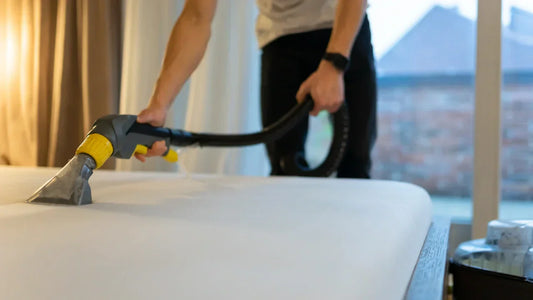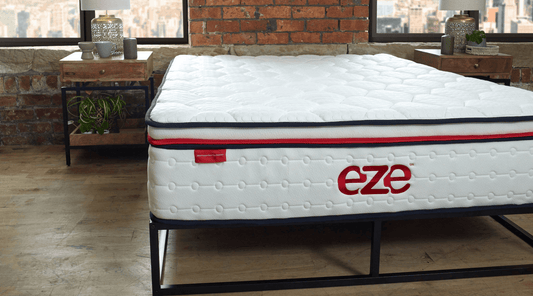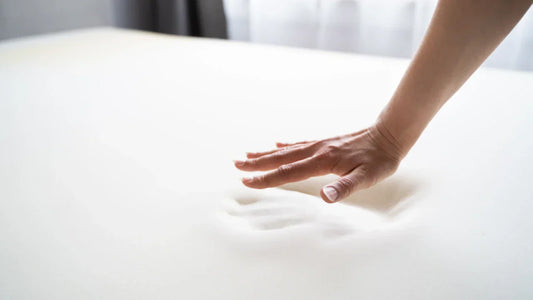Poor sleep, or a lack of it, are issues for many of us. In fact, a study showed that two thirds (67%) of UK adults suffer from disrupted sleep, with nearly a quarter (23%) managing no more than five hours of sleep per night.
Unfortunately, it also seems that good sleep becomes harder to achieve the older we get. In general, people’s sleep becomes lighter and more disruptive with more wake-ups during the night.
Do Older People Need Less Sleep?

It’s actually a myth that older people need less sleep than the young. Just like younger adults, The National Sleep Foundation guidelines advise that those over the age of 65 should get seven to eight hours of sleep each night.
So Why Does Age Affect Sleep?
As we get older, our habits change, and therefore our sleep habits do too. This is largely down to changes in our internal body clock, which is linked to the part of the brain called the hypothalamus.
Our hypothalamus is made up of around 20,000 cells, which together form the suprachiasmatic nucleus or SCN. This SCN controls our body’s circadian rhythms, influencing many parts of our daily cycle like when we feel hungry, when we release hormones and when we feel sleepy. Deterioration of the SCN function as we age disrupts our circadian rhythms, and consequently disrupts our sleep quality too.
Light exposure is one of the most important cues for regulating our circadian rhythms and as we age, we tend to get less exposure to daylight due to being inside more. The result is that our rhythms become less stable and unregulated.
Hormones can also play a role in disrupted sleep for older adults. The changes in our body’s hormone production, such as cortisol and melatonin, can also greatly affect the coordination of our circadian rhythms.
The Connection Between Health & Sleep

The link between physical health and quality of sleep is often complicated because of additional elements. For example, someone can be diagnosed with multiple conditions at the same time, making it hard to determine which condition is actually affecting their sleep.
Taking medication for health issues can often cause side-effects that are related to poor sleep. Certain drugs may cause drowsiness during the day or keep people awake during the night. If you consider that almost 40% of adults over the age of 65 take five or more medications simultaneously, you will see why it’s so hard to pinpoint the exact source of the problem.
Mental health conditions, such as depression and anxiety, can also play a big part in disrupting sleep. Many people who suffer from depression also suffer from excessive daytime sleepiness and hypersomnia (sleeping too much). This in turn disrupts those circadian rhythms again, meaning that during the night, their sleep might be poor quality.
Common Sleep Issues for Older People

Aches and pains are symptoms often associated with poor sleep. Pain can wake us during the night and make it hard for us to get to sleep in the first place.
Restless leg syndrome is also a common complaint for those who struggle to sleep. It affects many older people and causes an urge to move the legs while resting or sleeping. These involuntary movements of the legs and feet can cause restlessness during the night, waking us up.
Night-time urination is also another reason why many older people wake up in the middle of the night. Physical changes in the urinary system result in less production of the antidiuretic hormone that helps you to retain fluid. Muscles in the bladder may also weaken over time, making it harder to hold urine in the bladder for prolonged periods.
Improving Sleep with Age

Maintaining healthy behaviours and focussing on your physical and mental wellbeing can greatly impact your sleep, even as you age. Particularly eating a balanced diet, taking part in regular physical activity, and refraining from smoking and drinking alcohol can all contribute to reducing the risk of physical and mental health conditions, which are associated with bad sleep. These behaviours remain important throughout older age.
Getting as much exposure to natural daylight is also really important to help maintain the body’s natural circadian rhythms. Being sure to get outdoors regularly as well as sitting by a window to read or rest will both contribute to better regulation and better sleep.
Ensuring you have the right sleep environment is also a key factor. Be sure to invest in a new supportive mattress at least every seven years and maintain it well to get the best use out of it.
With a little effort and the right tools, you can help to minimise sleep deterioration as you enter later life.









